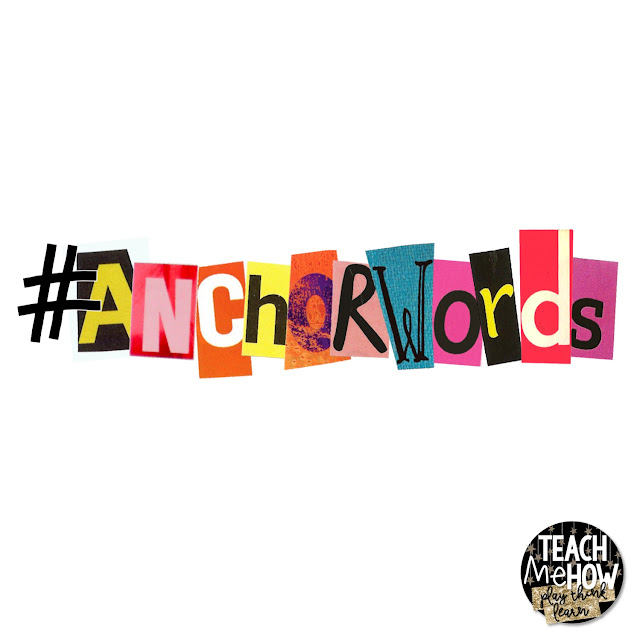My #anchorword recently has been: OBSERVE.
Lately, I've worked to focus my energy on more closely observing my own classroom and engaging in opportunities to observe other classrooms and teachers. I've found that peer observations, both those that I've done in other classroom and those that have been done by other teachers in my own classroom have been very beneficial for my professional growth and development. However, in general, I think that that most teachers don't often get many opportunities to visit with other teachers, watch how and what they're teaching and gain fresh ideas to bring back to their own classrooms.
Of course good educators know that so much can be learned by watching others teach, but when do we really have the time (and energy) do do it?!
Teachers get so caught up with the immediate needs of their own classrooms, preparing for assessments, planning lessons, collecting data ..... not to mention fighting for livable wages, dealing with politics and paperwork and so much more.... that we feel drained, overworked and overwhelmed far too much of the time. And people wonder why teacher burnout rates are so high in the first few years?!
What is Peer Observation?
 Peer Observation is an innovative but often under-utilized and lesser-known professional development tool for educators. While traditional observations done by administrators leave most teachers feeling stressed and anxious, peer observations are far less traumatic and can be beneficial for both participants.
Peer Observation is an innovative but often under-utilized and lesser-known professional development tool for educators. While traditional observations done by administrators leave most teachers feeling stressed and anxious, peer observations are far less traumatic and can be beneficial for both participants. Peer observation is a type of collaborative professional development that occurs between two or more educators. While there are many different peer observation models out there, the essential components for productive observations include: an observer, a teacher delivering instruction and scheduled time for discussion before and after the observation. There are many other factors concerning the teacher and observer that may impact the effectiveness of peer observation including experience level, communication skills, personality types, comfort and trust level, level of administrative support etc.
The process that I generally follow for conducting or hosting a peer observation includes the following steps: Plan, Observe, Reflect, Discuss, Apply, Evaluate.
1. PLAN - This part is relatively simple. I set up the observation AND a time to discuss following the observation (ideally immediately afterwards) with the teacher, ask a few basic questions about what the teacher will be teaching, if there is anything that I should know before my visit etc. I also ask the teacher if there is anything they want me to look for during the observation; perhaps they have a professional development goal that they've been working on and would like feedback.
2. OBSERVE - This step is also reasonably clear. I sit, watch and listen actively; I try to stay objective and stick with the facts of what I see and hear. Usually, I take notes about what what's going, what the students are doing, how the teacher manages the group, what the lesson is on, how the class is set up... I might write down ideas that I think I could try, thoughts about how the observation applies to my classroom etc. Be sure to write down questions that you want to ask the teacher later!
3. REFLECT - After the observation is over, I usually spend a few minutes reflecting on what I saw. In this step, I consider my thoughts and feelings about the observation rather than the objective facts of what I actually saw and heard. What did I like? What didn't I like? Why do I feel as I do? Following an observation, I often take a quick assessment of how I feel; was the group chaotic or calm? How do I think that the students felt in that class?
4. DISCUSS - During this time, I chat with the teacher about what I saw and ask the questions that I noted during my observation. This also might be the time that the teacher asks for thoughts about his/her teaching, the strategies that were used or perhaps ideas from the observer. Remember that peer to peer observation is NOT evaluative.
5. APPLY - Choose a concept or idea from the observation to try in your own classroom. Note how it worked out, further questions that you have about the idea or changes that you made to the idea to make it work in your classroom. This information from your application might be valuable to discuss in a follow up chat with that teacher in the future.
6. EVALUATE - Remember we're not evaluating the teacher. Evaluate the peer observation process. Consider how to make the process more valuable and beneficial, what parts were most helpful and what wasn't necessarily valuable.
This is the form that I use (you can grab it for FREE here!)
My Experience with Peer OBSERVATION
I recently stepped out of my own classroom and spent an entire day observing at another Montessori school just a few hours from my own. As the only Montessori teacher working at my school, I often feel like I teach alone on my own island that few people really understand. When I have questions or challenges in my classroom, I can't just walk down the hall to ask a colleague for advice. Sure, I have plenty of professional connections online that I could ask, but it's not quite the same as real live coworkers.
Fortunately, I have an AMAZING and supportive administrator who encourages teachers to visit other programs, see what other teachers are doing, connect with like-minded professionals and find fresh ideas to bring back to our own classrooms. She realizes that the short time that teachers might be out of the classroom for a professional day is exponentially beneficial for both the teachers and the students. Of course, it isn't that I get to take professional days all that often, but I fee lucky that I do get a few here and there!
Although I work alone most of the time (aside from my classroom assistant) I felt less alone while observing other Montessori teachers. It was refreshing to see a a few different classrooms, get ideas for new activities and observe how the teachers interact with their students. I took pages and pages of notes on various topics from ideas for new lessons, variations on old lessons, ideas for classroom set up, new ways to plan lessons and ideas for recording and using data. I had a chance to chat with several of the teachers that I observed and it felt great to be able to chat about the classroom and connect with others professionally. It was even nice to realize that the problems that I encounter in my classroom are not isolated only to my group of students; the teacher struggle is absolutely real!
When was the last time that you had a chance to really OBSERVE another teacher work in their classroom? What do you think the greatest benefit of professional observation is?




















